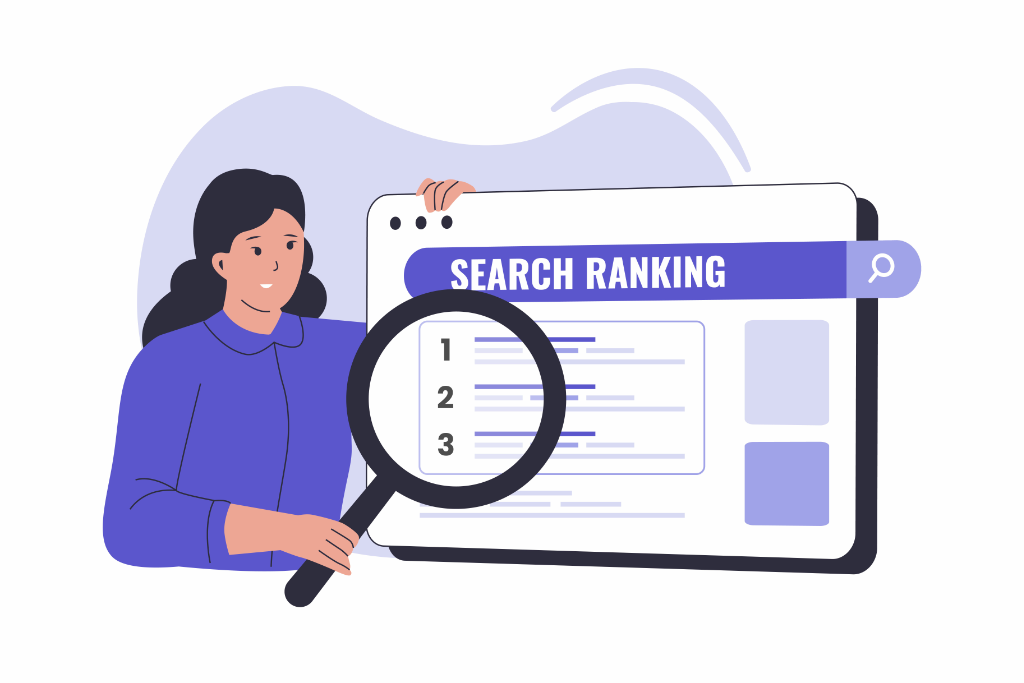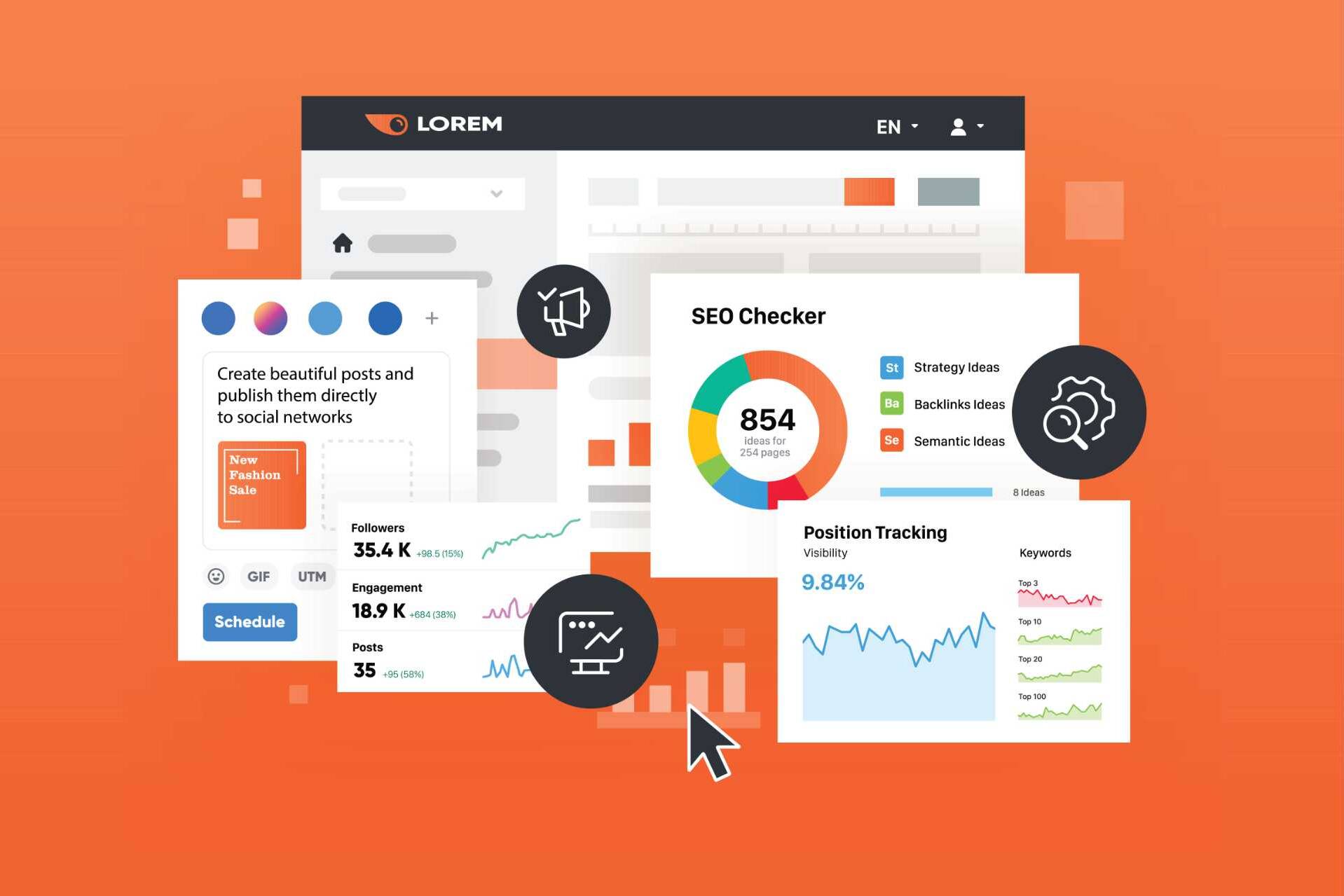If you’re looking to drive sustainable traffic to your website without spending a fortune, organic SEO is the answer.
It’s a proven, long-term strategy that focuses on improving your website’s visibility in search engines without relying on paid advertising. By optimising your content, improving your site’s technical performance and building a strong online presence, you can attract high-quality, engaged visitors who are genuinely interested in what you offer.
This guide provides the knowledge and tools needed to create an effective organic SEO strategy for your business.
What’s in this guide?
- What is organic SEO?
- Why is organic SEO important?
- How does organic SEO work?
- How long does it take?
- How organic SEO can benefit your business
- What are the key components of organic SEO?
- Are you ready to get started with your organic SEO strategy?
What is organic SEO?
 Organic search engine optimisation (SEO) refers to getting your website to rank higher in search engine results pages (SERPs) without needing to rely on paid ads, such as PPC. It uses a blend of strategic techniques – from smart keyword research to engaging content creation and effective link building – to make your website more relevant and valuable for both search engines and users.
Organic search engine optimisation (SEO) refers to getting your website to rank higher in search engine results pages (SERPs) without needing to rely on paid ads, such as PPC. It uses a blend of strategic techniques – from smart keyword research to engaging content creation and effective link building – to make your website more relevant and valuable for both search engines and users.
The real goal with SEO?
To align your website perfectly with search engine algorithms and your audience’s intent. Organic SEO helps build trust, authority and relevance for your site, laying a strong foundation for sustained, long-term growth.
When you prioritise organic SEO, you’re investing in a digital strategy that’s all about creating meaningful connections with your audience, increasing visibility and driving consistent results that don’t fade with time.
Read our guide to 5 steps to the perfect SEO strategy.
Why is organic SEO important?
Organic SEO is the backbone of a successful digital marketing strategy.
It’s crucial because it generates high-quality traffic, builds trust with your audience and consistently delivers a better return on investment (ROI) over time compared to paid search. Unlike ads, which stop working the moment you pause spending, organic SEO keeps driving results long after the initial investment.
Here’s a staggering fact – between 70% and 80% of users ignore paid ads and focus on organic results. By investing in organic SEO, you’re positioning your business exactly where your audience is actively searching for answers.
Organic search is also responsible for 53% of all website traffic – cementing its place as a vital pillar of sustainable growth and long-term success.
How does organic SEO work?
 If Google’s main goal is to provide users with the best possible results, the purpose of organic SEO is to create a website and content that deserves to be at the top of those results.
If Google’s main goal is to provide users with the best possible results, the purpose of organic SEO is to create a website and content that deserves to be at the top of those results.
To achieve this, organic SEO works by aligning your website with search engine algorithms and user intent.
Search engines such as Google prioritise pages that offer relevant, high-quality content, deliver a seamless user experience, and demonstrate authority and trustworthiness – often known as Google E-E-A-T.
An effective organic SEO strategy combines techniques that work together to optimise your site.
Key considerations include:
- Keyword research – Identifying the right keywords to target so your website appears when people search for terms related to your business.
- Content creation – Crafting valuable content that incorporates these keywords and answers user questions, from blog posts to product descriptions.
- Multimedia – Using visuals such as images, infographics and videos to keep visitors engaged and improve time spent on site.
- Alt text for images – Adding descriptive text to your images so search engines understand their context.
- User-centric design – Simplifying navigation, improving usability, and ensuring your site looks and functions perfectly across all devices.
- Page speed optimisation – Ensuring fast load times to prevent visitors from bouncing straight away.
- Link building – Ensuring your pages connect seamlessly, helping both users and search engines navigate your site more effectively.
Ready to take the first step?
Start by conducting a website audit using tools such as Google Search Console, Ahrefs, SEMrush or Screaming Frog. These tools can help you uncover opportunities for optimisation, from identifying broken links to analysing keyword performance and site speed. With these insights, you can build a strategy that resonates with both search engines and your audience, driving long-term success.
Read our guide on why you should conduct a website content audit.
How long does it take?
Organic SEO is a long-term strategy.
While some improvements may show within a few weeks, achieving consistent and meaningful results typically takes 3 to 6 months or even longer. The timeline depends on factors like your competition, your industry and the current state of your website.
Remember, patience pays off! The results of a well-executed organic SEO strategy compound over time, making it one of the most cost-effective marketing investments.
How organic SEO can benefit your business
Organic SEO offers a wide range of benefits that can transform your online presence and drive meaningful results.
Here’s how it can make an impact:
- Increased visibility – Organic SEO improves your website’s ranking in search results, making it easier for potential customers to find you. Higher rankings boost traffic and help establish your presence as a credible player in your industry.
- Better credibility – Appearing at the top of search results signals authority and trustworthiness. Users are more likely to trust a site that ranks well organically and this credibility strengthens with consistent, valuable content.
- Targeted traffic – Organic SEO helps attract users actively searching for products or services like yours. This means your site receives visitors who are already interested, leading to higher engagement and better conversion rates.
- Scalability – As your business grows, so does the impact of organic SEO. It adapts to changes in search behaviour and market trends, making it a strategy that evolves alongside your goals.
- Cost-effectiveness – Unlike paid ads, which require continuous investment, organic SEO delivers long-term results. Once optimised, your website continues to perform without ongoing ad spend, giving you sustainable value.
- Sustainable growth – Organic SEO builds a foundation of visibility and relevance that withstands changes in algorithms and industry trends. This makes it a dependable approach for lasting growth.
Prioritising organic SEO means that you’re building a digital presence that connects with your audience and positions your brand for sustained success.
What are the key components of organic SEO?
 1. Keyword research
1. Keyword research
Keyword research is the foundation of any impactful organic SEO strategy.
At its core, it’s about understanding what your target audience is searching for and ensuring your content is there to meet their needs. By uncovering the right keywords, you’re not just optimising for search engines; you’re creating a bridge between your business and your audience.
Here’s how you can approach keyword research effectively:
- Understand your audience – The best keywords come from a deep understanding of your audience’s challenges, goals and the language they use. Dive into customer pain points and industry trends to identify terms that resonate.
- Competitor analysis – Researching the keywords your competitors rank for can highlight gaps or niches you can dominate. It’s about finding where you can outperform them in relevance and quality.
- Use keyword tools – Tools like SEMrush, Ahrefs or Keyword Planner enable you to uncover high-value keywords and integrate them strategically into your website. They provide valuable insights into search volumes, competition levels and keyword opportunities. Use these tools to refine your focus and uncover hidden gems.
- Target long-tail keywords – Long-tail keywords are specific, highly targeted phrases that often indicate clear intent. For example, someone searching for ‘buy office furniture online’ is much closer to converting than someone searching for ‘furniture’.
- Match intent with the content – Every keyword has an intent – informational, navigational, commercial or transactional. Aligning your content with the intent behind a search query is crucial for driving engagement and conversions.
Great keyword research is about ensuring your content connects with the people who matter most to your business.
2. Content creation
Engaging, high-quality content is the cornerstone of a successful organic SEO strategy – delivering value that connects with your audience on a deeper level and drives meaningful engagement.
- Every piece of content should address the needs and interests of your audience. Create articles, guides or videos that answer questions, solve problems and provide actionable insights.
- Tell compelling stories to bring your brand to life. Whether it’s about a customer’s journey or your own behind-the-scenes process, stories encourage an emotional connection with your audience.
- Publish content regularly to keep your audience engaged and signal to search engines that your site is active. Refresh older posts with updated data or new perspectives to maintain their relevance.
- Add clear calls-to-action (CTAs) that invite readers to comment, share or explore more. Engagement not only boosts SEO but also builds a loyal community around your brand.
Valuable content goes beyond answering search queries; it builds trust, establishes authority and positions your brand as a go-to resource.
Read our step-by-step guide to creating SEO content.
3. On-page SEO
On-page SEO is all about optimising the elements within your website to improve search engine visibility and improve user experience. It’s where technical precision meets content strategy, ensuring that every part of your site contributes to your overall SEO goals.
Things you should consider include:
- Title tags and meta descriptions
- Header tags (H1, H2, H3 and so on)
- Internal linking
- URL structures
- Image optimisation
- Content optimisation
- Mobile-friendliness
Read our guide to learn how to optimise images for SEO.
4. Technical SEO
Technical SEO forms the backbone of a well-optimised website, ensuring that search engines can crawl, index and understand your site effectively.
It focuses on the technical aspects that impact search engine visibility and user experience.
A fast-loading website is critical for user retention and search engine rankings. Slow sites can frustrate users, which leads to higher bounce rates, and search engines prioritise fast, responsive websites. Tools such as Google PageSpeed Insights can identify bottlenecks and suggest improvements you can make to your website.
Ensuring ‘crawlability’ and indexability is vital.
Search engines need to access and understand your site’s structure. At Submerge, we use tools such as Screaming Frog, GTMetrics, SEMrush and Google Search Console to help identify and fix issues like broken links, orphaned pages, slow-loading pages and crawl errors.
Other aspects you should focus on include:
- Mobile responsiveness
- Secure connections (HTTPS)
- Fixing broken links and errors
- Structured data
- XML sitemaps and robots.txt files
5. Off-page SEO
Off-page SEO builds your website’s authority through activities like link building, social sharing and influencer outreach.
Quality backlinks from reputable sites signal to search engines that your content is valuable and trustworthy.
Getting backlinks from reliable, high-quality domains is important to establish your site’s credibility and improve its search rankings.
However, off-page SEO isn’t limited to link building:
- Guest blogging – Writing articles for other websites in your niche can help you gain backlinks while positioning your brand as an authority in your field.
- Social media engagement – Although social media signals don’t directly impact rankings, sharing your content on platforms like Twitter, LinkedIn and Facebook can drive traffic and amplify your reach.
- Brand mentions – Earning mentions from trusted sources, even without a direct link, can enhance your site’s reputation and visibility.
- Community participation – Engaging in online forums, industry-specific communities and Q&A platforms like Reddit helps showcase your expertise and can generate organic traffic to your site.
Off-page SEO is about building relationships and trust. Focusing on strategies that go beyond links allows you to create a digital presence that strengthens your brand’s authority and credibility.
Find out more about our SEO link-building services.
6. Local SEO
 Optimising for local search is essential for businesses targeting local customers.
Optimising for local search is essential for businesses targeting local customers.
Claim your Google Business Profile and ensure consistent NAP (Name, Address, Phone Number) information across all platforms.
Also, make use of location-specific keywords in your content and meta descriptions to improve visibility for local searches. Participating in local events or sponsoring community initiatives can also improve your business’s presence and encourage connections within your area.
You should also ensure your business appears in local directories and map services like Apple Maps and Bing Places. Accurate listings make it easier for customers to find you.
Lastly, encourage customers to share their experiences online. Positive reviews not only build trust but also signal to search engines that your business is reputable and engaged with its community.
Are you ready to get started with your organic SEO strategy?
Organic SEO is a game-changer for businesses looking to build a lasting online presence.
By focusing on quality, relevance and user experience, you can drive meaningful results that grow over time.
Need expert guidance to kickstart your organic SEO strategy? Contact us today – we’re here to help you make an impact!
Related Digital Marketing Resources
19/03/2025
10 best Domain Authority checkers
Understand your website's standing with a domain authority checker and take…
15/03/2025
Domain Authority – what is it and how do I boost it?
Find out what is domain authority and how it impacts your website's performance…
10/03/2025
How to find an SEO expert – the only guide you’ll ever need
Need help with SEO? Find out how to find an SEO expert to help your business…


